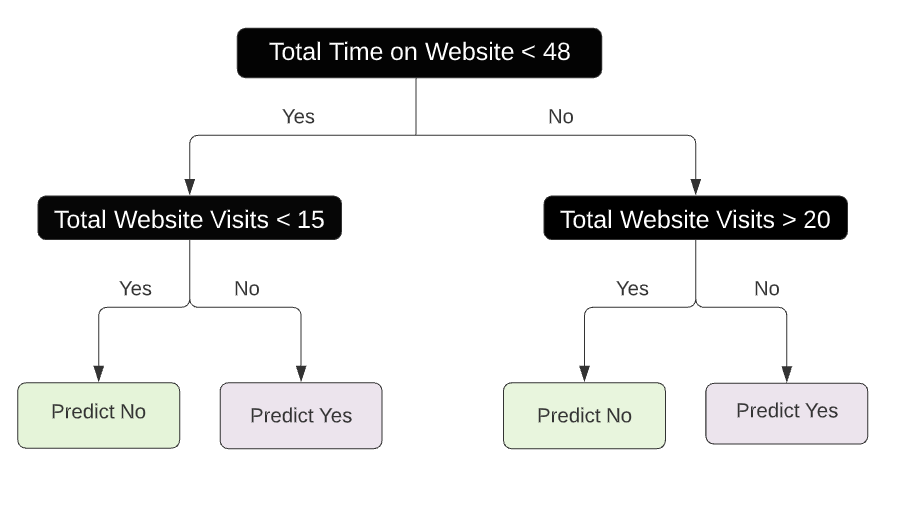Hyperparameter tuning
Modeling with tidymodels in R

David Svancer
Data Scientist
Hyperparameters
Model parameters whose values are set prior to model training and control model complexity
parsnip decision tree
cost_complexity- Penalizes large number of terminal nodes
tree_depth- Longest path from root to terminal node
min_n- Minimum data points required in a node for further splitting

Default hyperparameter values
decision_tree() function sets default hyperparameter values
cost_complexityis set to 0.01tree_depthis set to 30min_nis set to 20
These may not be the best values for all datasets
- Hyperparameter tuning
- Process of using cross validation to find the optimal set of hyperparameter values
dt_model <- decision_tree() %>%
set_engine('rpart') %>%
set_mode('classification')
Labeling hyparameters for tuning
The tune() function from the tune package
- To label hyperparameters for tuning, set them equal to
tune()inparsnipmodel specification - Creates model object with tuning parameters
- Will let other functions know that they need to be optimized
dt_tune_model <- decision_tree(cost_complexity = tune(), tree_depth = tune(), min_n = tune()) %>% set_engine('rpart') %>% set_mode('classification')dt_tune_model
Decision Tree Model Specification (classification)
Main Arguments:
cost_complexity = tune()
tree_depth = tune()
min_n = tune()
Computational engine: rpart
Creating a tuning workflow
workflow objects can be easily updated
- Prior
leads_wkfl- Feature engineering steps for lead scoring data and decision tree model with default hyperparameters
- Pass
leads_wkfltoupdate_model()and provide new decision tree model with tuning parameters
leads_tune_wkfl <- leads_wkfl %>%update_model(dt_tune_model)leads_tune_wkfl
== Workflow ===============
Preprocessor: Recipe
Model: decision_tree()
-- Preprocessor -----------
3 Recipe Steps
* step_corr()
* step_normalize()
* step_dummy()
-- Model ------------------
Decision Tree Model Specification (classification)
Main Arguments: cost_complexity = tune()
tree_depth = tune()
min_n = tune()
Computational engine: rpart
Grid search
Most common method for tuning hyperparameters
- Generate a grid of unique combinations of hyperparameter values
- For each combination, use cross validation to estimate model performance
- Choose best performing combination
| cost_complexity | tree_depth | min_n |
|---|---|---|
| 0.001 | 20 | 35 |
| 0.001 | 20 | 15 |
| 0.001 | 35 | 35 |
| 0.001 | 35 | 15 |
| 0.2 | 20 | 35 |
| ... | ... | ... |
Identifying hyperparameters
The parameters() function from the dials package
- Takes a
parsnipmodel object - Returns a tibble with the hyperparameters labeled by the
tune()function, if any- Used for generating tuning grids with the
dialspackage
- Used for generating tuning grids with the
parameters(dt_tune_model)
Collection of 3 parameters for tuning
identifier type object
cost_complexity cost_complexity nparam[+]
tree_depth tree_depth nparam[+]
min_n min_n nparam[+]
Random grid
Generating random combinations
- This method tends to provide greater chances of finding optimal hyperparameter values
The grid_random() function
- First argument is the results of the
parameters()function sizesets the number of random combinations to generate- Execute
set.seed()function beforegrid_random()for reproducibility
- Execute
set.seed(214) grid_random(parameters(dt_tune_model),size = 5)
# A tibble: 5 x 3
cost_complexity tree_depth min_n
<dbl> <int> <int>
1 0.0000000758 14 39
2 0.0243 5 34
3 0.00000443 11 8
4 0.000000600 3 5
5 0.00380 5 36
Saving a tuning grid
First step in hyperparameter tuning
- Create and save a tuning grid
dt_gridcontains 5 random combinations of hyperparameter values
set.seed(214) dt_grid <- grid_random(parameters(dt_tune_model), size = 5)dt_grid
# A tibble: 5 x 3
cost_complexity tree_depth min_n
<dbl> <int> <int>
1 0.0000000758 14 39
2 0.0243 5 34
3 0.00000443 11 8
4 0.000000600 3 5
5 0.00380 5 36
Hyperparameter tuning with cross validation
The tune_grid() function performs hyperparameter tuning
Takes the following arguments:
workfloworparsnipmodel- Cross validation object,
resamples - Tuning grid,
grid - Optional
metricsfunction
Returns tibble of results
.metrics- List column with results for each fold
dt_tuning <- leads_tune_wkfl %>%tune_grid(resamples = leads_folds,grid = dt_grid,metrics = leads_metrics)
dt_tuning
# Tuning results
# 10-fold cross-validation using stratification
# A tibble: 10 x 4
splits id .metrics ..
<list> <chr> <list> ..
<split [896/100]> Fold01 <tibble [15 x 7]> ..
................ ...... ............... ..
<split [897/99]> Fold09 <tibble [15 x 7]> ..
<split [897/99]> Fold10 <tibble [15 x 7]> ..
Exploring tuning results
The collect_metrics() function provides summarized results by default
- Average estimated metric values across all folds per combination
dt_tuning %>%
collect_metrics()
# A tibble: 15 x 9
cost_complexity tree_depth min_n .metric .estimator mean n std_err .config
<dbl> <int> <int> <chr> <chr> <dbl> <int> <dbl> <chr>
1 0.0000000758 14 39 roc_auc binary 0.827 10 0.0147 Model1
2 0.0000000758 14 39 sens binary 0.728 10 0.0277 Model1
3 0.0000000758 14 39 spec binary 0.865 10 0.0156 Model1
4 0.0243 5 34 roc_auc binary 0.823 10 0.0147 Model2
. ...... .. .. .... ...... ..... .. ..... ......
14 0.00380 5 36 sens binary 0.747 10 0.0209 Model5
15 0.00380 5 36 spec binary 0.858 10 0.0161 Model5
Let's get tuning!
Modeling with tidymodels in R

